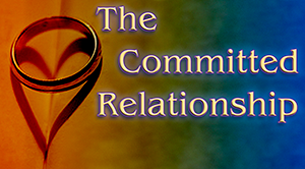
 motionally committed relationships bring excitement and passion into our lives, especially when they are new.
motionally committed relationships bring excitement and passion into our lives, especially when they are new.
Over time, however, we come across roadblocks, for example, our personal issues or family experiences, that can distance us from our partners. When we first enter into a committed relationship, we may think that we have found the answer to life’s problems, that we have a partner to share in the turmoil of daily life, that we will never be alone again, that it will be smooth sailing from here on out. If we base relation-ships on these assumptions, however, we may be sorely disappointed when our partner fails to live up to these expectations. There is a strong probability that if we look to another person to provide fulfillment, we will begin to focus on the failings of that person as the cause of our own disap-pointments in life. This pattern is the reason for a great deal of discord in committed relationships. Many people who come in for relationship therapy actually hope that the therapy will change their partner because they are convinced that the partner is the source of the problem.
Over time many relationships enter a stage where the partners feel distanced from each other. The initial passion, sexual freedom, intimacy, and feelings of connectedness with the partner fade. Either person may begin to feel that, although they love their partner, they are no longer “in love.” At the same time, both partners may feel that they have lost themselves in the relationship. They have given so much to the relationship in terms of their time, their energies, and their emotions, that they have lost what made them feel unique as individuals. They have abandoned old friendships, hobbies, and activities that brought interest and excitement to their own lives in order to devote time and energy to the relationship. When a feeling of distance comes to define the relationship, resentment toward the partner may emerge.
|
|
|
| |

 Robert F. Smith Robert F. Smith
 Licensed Therapist Licensed Therapist 
 Certified Addiction Counselor Certified Addiction Counselor
 License Number - SW010318L License Number - SW010318L
 Phone -484-686-4903 Phone -484-686-4903
 Fax -610-491-9253 Fax -610-491-9253
 Website - www.lifeissuescounseling.com Website - www.lifeissuescounseling.com 
I am in Private Practice and specialize in the
areas of
-
Family Counseling
-
Individual and Couples Counseling
-
LGBT and
-
Adolescents
I work with people regardless of age, race or
sexual preference. Clients who struggle with–
-
Anger
-
Relationships
-
Intimacy and
-
Communication
often find working with
LIFE ISSUES COUNSELING
a rewarding way to gain a sense of balance in
their lives.
"People will forget what you said. They will
forget what you did, but they will never forget
how you made them feel."
 – Maya Angelou – Maya Angelou
|
|
|
How does a relationship, which may have once shown such promise, end up in a place where the two partners feel distant and may not even like each other very much (even though they feel that the love is still there)? The answer lies within. Two people who come together in an emotional commitment carry with them a legacy of their own fears, anxieties, and unresolved problems. It is sometimes uncomfortable for us to come to terms with our own baggage. It is, in fact, so troublesome that we are unable to look within ourselves. When that happens, we tend to attribute the problem to our partner, a process called projection. Rather than accepting the fact that our partners are just being themselves and probably have the best of intentions, we define the source of our own anxiety as lying within the other person. When we feel uncomfortable about something our partners say or do, we may not realize that our discomfort may derive from a source that we have not examined within ourselves – like our own control issues, our jealousy, our insecurity, or our fear of dependence or independence. Our partners may simply be triggering our own unresolved difficulties. The clue is to search within our own lives to see why we have difficulty with these issues. And this is no small task. To become acquainted with oneself is indeed a terrible shock.
The Course of a Relationship
Relationships mature over time. The initial attraction may be physical, and this may carry the relationship for some time to the point of making an emotional commitment. Then the excitement and promise of sharing our life with another person can lead to a stage of heightened expectations where we ignore or minimize the discomfort that we may feel from time to time in the relationship. But this stage comes to an end and we finally express our frustration. “Why are you always telling me what to do?” “Can’t you give me any time to myself?” “Don’t you know who I am?” “Why don’t you shower me with love like you used to?” Notice in these examples that blame is cast on the other person. The one hurling the blame does not look within (for example, “I have difficulty because of my own issues when someone tells me what to do.”). This is a particularly vulnerable stage in the course of an emotionally committed relationship, and can serve as a make or break challenge. It is at this stage that an equilibrium – or, more accurately, a standoff – is reached by the two partners. “I won’t challenge you and you won’t challenge me, and we’ll just accept the fact that we will be distant from each other.” In contrast, healthier relationships move into a different and more mature stage – where both partners look within to find the source of their own anxiety, find ways to soothe themselves without trying to change the other person, and learn to accept and love the other person despite their frustrating quirks. When this occurs, and when the distance between the partners has been resolved, the genuine excitement and passion of the relationship can continue to flourish – this time in a mature, accepting, and integrated manner.
 Differentiation Differentiation
David Schnarch, Ph.D., the author of Passionate Marriage, suggests that in order to grow within an emotionally committed relationship, we must experience the process of “differentiation.” This means holding onto yourself within a relationship, staying true to what you want out of life while sharing your life with a partner. Differentiation allows us to break free from the negative processes that happen between partners in any relationship. It allows us to take a time out from arguments in order to comfort ourselves. It leads to self-control, which means that we can stop trying to control our partners. The differentiated partner is able to soothe him- or herself rather than pressuring the other person to change in order to make the first one feel better. Paradoxically, when partners differentiate, they actually have the ability to achieve more intimacy, while undifferentiated partners can stay locked in their emotional standoff. And when one partner differentiates, it upsets the old equilibrium that had developed so that the other partner is prompted to make changes as well. In short, a healthy relationship is one in which two people, each of whom has a firm sense of self, come together and celebrate both their differences and their similarities.
 Schnarch identifies several activities
that happen when a person differentiates. Schnarch identifies several activities
that happen when a person differentiates.
 • Maintaining a clear sense of who you are within the relationship. Your partner was probably originally attracted to you because of the strength of your unique qualities. Both of you knew what you valued and believed in. Over time, because we accommodate ourselves to both our own and our partner’s more immature qualities and unresolved issues, we lose our sense of uniqueness. We compromise ourselves with the goal of smoothing out conflicts and fail to realize that we are losing our sense of self in the process. We may find that we have lost those qualities that were once so attractive to our partner. Differentiation involves looking within, gaining a firm definition of who we are, and celebrating our uniqueness • Maintaining a clear sense of who you are within the relationship. Your partner was probably originally attracted to you because of the strength of your unique qualities. Both of you knew what you valued and believed in. Over time, because we accommodate ourselves to both our own and our partner’s more immature qualities and unresolved issues, we lose our sense of uniqueness. We compromise ourselves with the goal of smoothing out conflicts and fail to realize that we are losing our sense of self in the process. We may find that we have lost those qualities that were once so attractive to our partner. Differentiation involves looking within, gaining a firm definition of who we are, and celebrating our uniqueness
 • Maintaining a sense of perspective. We need to accept the fact that we all have anxieties and other shortcomings. This is part of the human condition. The mature person, however, understands that these frailties need not determine our behavior. Our limits should neither incapacitate nor drive us. When we honestly accept this fact both in ourselves and in our partners, we can take a more balanced approach in dealing with each other’s limitations. The peaks and valleys of crises can be smoothed out. The blaming can come to an end, replaced by acceptance and love for the other person. • Maintaining a sense of perspective. We need to accept the fact that we all have anxieties and other shortcomings. This is part of the human condition. The mature person, however, understands that these frailties need not determine our behavior. Our limits should neither incapacitate nor drive us. When we honestly accept this fact both in ourselves and in our partners, we can take a more balanced approach in dealing with each other’s limitations. The peaks and valleys of crises can be smoothed out. The blaming can come to an end, replaced by acceptance and love for the other person.
 • Committing to a willingness to engage in self-confrontation. Looking within is difficult, but it is a necessary step both in our own life development and in helping our relationships to grow to new levels. Self-confrontation means coming to terms with our own fears, anxieties, and insecurities, a process that may be aided by professional psychotherapy. It may mean accepting the criticisms of our partners as a source of valuable feedback about where our insecurities lie. Self-examination can focus on understanding how and why we manipulate others, undermine our own effectiveness, take a selfish approach at times (or, alternatively, give to others and never to ourselves), and work against our own best interests. We need to understand why we avoid ourselves, and then we need to make an honest commitment to enter into a path of honesty and integrity. • Committing to a willingness to engage in self-confrontation. Looking within is difficult, but it is a necessary step both in our own life development and in helping our relationships to grow to new levels. Self-confrontation means coming to terms with our own fears, anxieties, and insecurities, a process that may be aided by professional psychotherapy. It may mean accepting the criticisms of our partners as a source of valuable feedback about where our insecurities lie. Self-examination can focus on understanding how and why we manipulate others, undermine our own effectiveness, take a selfish approach at times (or, alternatively, give to others and never to ourselves), and work against our own best interests. We need to understand why we avoid ourselves, and then we need to make an honest commitment to enter into a path of honesty and integrity.
 • Acknowledging our projections and distortions of reality that protect us from ourselves. • Acknowledging our projections and distortions of reality that protect us from ourselves.
We need to understand why we blame others, especially our emotionally committed partners, rather than acknowledging our own participation in interpersonal conflicts. This involves admitting when we are wrong. We should not expect that our partners will do likewise. Taking an honest approach toward our own lives is a tough, but rewarding, journey into personal integrity. When we embark on this journey, our partners, who are no longer feeling blamed and know that the old emotional standoffs have been eliminated, will often decide to begin their own excursions into self-growth.
  • Learning to tolerate the pain involved in self-exploration. • Learning to tolerate the pain involved in self-exploration.
Dealing with emotional pain is a talent that can be learned. In childhood many of us learned unhealthy ways of handling discomfort, often because we lacked supportive role modeling from our parents or other adults that would have taught us how to deal with pain in a healthier way. We may have learned to blame our parents when we faced life’s difficulties, and then we carry this blaming behavior into our committed relationships in adulthood. Avoiding pain is the reason many adults indulge in substance abuse or other addictive behaviors such as gambling, inordinate spending, or watching too much television. The healthier option is to make the adult commitment to explore the pain and its sources – and to find ways to make self-growth a friend rather than something to avoid. When we learn to cope with our own pain, we no longer need to manipulate our partners into making us feel better.
And when this happens, the magic can re-enter our relationships.
Recommended Reading
Schnarch, David. Passionate Marriage– Keeping Love and Intimacy Alive
in Committed Relationships.
New York: Henry Holt and Company, 2011, 448 pages, $16.00. ISBN: 978-0825305672.
This well-written book combines principles of relationship therapy and sex therapy into a useful hands-on approach for couples who want to work together to overcome the sexual and emotional barriers that prevent them from finding a
satisfying life with each other.
|
|

